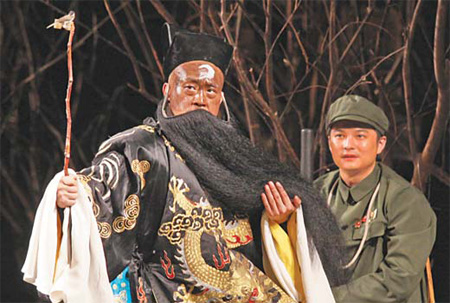 |
|
He Bing plays the lead role of a retired Peking Opera artist who trains his bird to sing just like he trains his apprentice. [Jiang Dong] |
Beijing People's Art Theater (BPAT) can boast of a variety of successful dramas over its 57-year history and Bird Men (1993) is one of them.
Even so, when it was originally offered the leaders of BPAT turned the play down as being too absurdist.
However, Guo Shixing's script was eventually accepted, thanks to a strong recommendation from BPAT director Lin Zhaohua. Bird Men was eventually put on stage in 1993 and it turned out to be a great success.
People queued in lines 100 m long to see the play and it ran continuously for more than 130 shows, a record in the capital's theater scene that year.
Some 16 years have passed and playwright Guo and director Lin have once more collaborated to revive the drama on BPAT's stage.
As the title suggests, the play centers on a group of people who love birds. But their passion is extreme and even weird.
A retired Peking Opera artist San Ye (He Bing) trains his bird to sing just the way he trains his apprentice; the old man Zhang (Zhang Fuyuan) is infuriated because his lark sings a dirty song. The psychologist Dr Ding (Pu Cunxin) believes they are mentally ill and tries to help them solve their psychological problems; a bird expert Dr Chen (Yan Yansheng) is on a mission to find an endangered species of bird but he seems more interested in others' privacy.
"Bird man" is also a swear word in Chinese and here the playwright uses it to satirize those who focus on meaningless or trivial matters to escape the responsibilities of life.
"Though the play was a hit in 1993, I don't think all the audience understood it at that time. The absurdity, or fables of these characters were new to them," says Guo, who used to be a journalist.
"I believe today's audiences will really appreciate it. People's vision of the theater has become much wider and absurd theater is no longer strange to them. And most importantly, the messages the play offers still matter today."
Guo's absurdism, sarcasm and black humor are what director Lin appreciates. "Theater is a game; it's an entertainment for people to have fun together. Bird Men is such an interesting and inspirational play," says Lin.
When it premiered in 1993, some critics opined it was not drama, but rather a crosstalk show. "Whatever it is, it's an interesting show. It's Chinese humor and behind humor, it implies many things that deserve thinking about," Lin says.
People are more open to the theater style, story and characteristics, but it does not mean a 16-year-old play will match present day sentiments.
First of all, Guo says, society has changed so dramatically that it's difficult to find such passionate bird lovers. The young actors cannot find examples of people like San Ye or old Zhang.
Other details from the early 1990s also no longer exist today. For example, the Peking Opera artist had nothing to do but feed birds; psychologists were unusual in those days; people were excited to meet foreigners. These are no longer the case.
But the revival is a good opportunity to combine modern absurd theater with Peking Opera and some Chinese folk customs, such as yangge dance. Guo's inspiration partly came from his interviews with many Peking Opera artists when he was a journalist, while Lin is known for using traditional Chinese culture and folk operas and combining them in modern theater.
Last but not least, for young people who do not speak the old Beijing dialect, or know nothing about caring for birds, it's really challenging to follow the first 20 minutes as a dozen people noisily discuss bird species, how to feed them and train them to sing.
Bird Men is running at the Capital Theater of Beijing People's Art Theater till Aug 9.
(China Daily July 28, 2009)